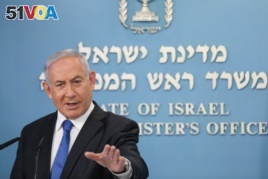18 August 2020
Some Israelis are looking forward to going to Dubai and visiting the world's tallest building, the Burj Khalifa.
Although people from all over the world visit Dubai, Israelis could not because the Emirate did not have diplomatic relations with Israel. That will change soon.
Last week, the United Arab Emirates (UAE) announced plans to establish full diplomatic ties with Israel. That would make the UAE only the third Arab nation to do so.
The move has caused a lot of interest in Israel. It will bring years of covert business and security ties into the open. And it will open an appealing destination for travel-happy Israelis.
Israeli television stations have already sent reporters to the rich Persian Gulf nation. Local media has shown images of Dubai's tall, shiny buildings, huge shopping malls, manmade islands and coastline. Newspapers have been publishing stories about a "new Middle East." They are also stories about the Emirati economy, countryside, and ruling family.
The United States negotiated the diplomatic deal between Israel and the UAE. The agreement also extends an alliance against Iran. The UAE has said it halted Israel's contentious plans to claim up to one-third of the West Bank. The Palestinians also want that land as part of a Palestinian state.
For many Israelis, however, the appeal of ties with the UAE lies mainly in reaching their goal of acceptance in the Middle East. They also think that ties will improve tourism and business opportunities.
Gadi Nir is co-founder and chief of Bobo, an Israeli company that makes physiotherapy and rehabilitative products. His business recently signed one of Israel's first deals with a UAE company.
Nir told The Associated Press that, in the past, his company had to use other companies to do business with the UAE.
"We used to have to ‘launder the products' and go through all kinds of intermediaries to do business with Arabs," said Nir. "Now we can get personal. We don't have to hide under the carpet anymore," he added.
The Carnegie Endowment for International Peace estimates that hidden trade between Israel and the Gulf states is more than $1 billion a year. A large part of that is between Israel and the UAE. Now, those numbers are likely to increase.

Israel's Prime Minister Benjamin Netanyahu announces full diplomatic ties will be established with the United Arab Emirates, during a news conference on Thursday, Aug. 13, 2020 in Jerusalem.
The agreement between the countries is supposed to include direct flights, although that could require approval from Saudi Arabia to use its airspace. Israeli Prime Minister Benjamin Netanyahu said Monday that work to establish the flight paths was taking place.
Israeli travel agents say they have already received many calls from Emirati travel agents. In addition, Israel's president, Reuven Rivlin sent a letter to Crown Prince Mohammed bin Zayed Al Nahyan to invite him to visit Israel.
The surprise statement last week has caused many people to wonder which Arab nation will be next. For Israel, Saudi Arabia — which still has not commented publicly on the UAE's decision — would be the biggest prize.
It is not a surprise that the UAE would be the first state in the Gulf to establish ties with Israel. The UAE is a grouping of seven sheikhdoms that was founded in 1971. It has no major history with Jews, no shared border, and no direct conflict with Israel.
Emirati officials had permitted Israeli government officials to visit in recent years. Some Israelis have long been interested in the UAE, and especially Dubai. Israelis who have foreign passports visit often. Israeli delegations have been given special permission to visit.
Many Israelis hope ties with the UAE will develop into a far warmer relationship than those with Egypt and Jordan, which made peace with Israel after many years of conflict.
Erel Margalit is an investor and a former Israeli lawmaker. He says there is Emirati interest not only in buying goods but in joint investing in technology.
Margalit predicted diplomatic ties would bring Israel closer to other Arab nations. "It's about building relationships for the long term."
Ross Kriel is president of the Jewish Council of the Emirates. He called the establishment of diplomatic ties a "sea change."
"Our community members look forward to direct flights to Israel and welcoming Israeli friends and visitors to the UAE," he said.
I'm Mario Ritter, Jr.
Aron Heller reported this story for the Associated Press. Mario Ritter Jr. adapted it for VOA Learning English. George Grow was the editor.
________________________________________________________________
Words in This Story
covert – adj. done in a way that is not easily seen; secret or hidden
destination – n. the place to which someone is going
shopping mall – n. a large building or series of buildings containing stores and restaurants
contentious – adj. something that is argued or disputed
tourism – n. the operation of vacations and visits to places of interest
rehabilitative – adj. related to the action of returning someone to health or normal life
launder – v. to secretly carry out financial activities through a business or bank
carpet – n. flood covering
sea change –n. (idiom) a big and sudden change
We want to hear from you. Write to us in the Comments section, and visit 51VOA.COM.